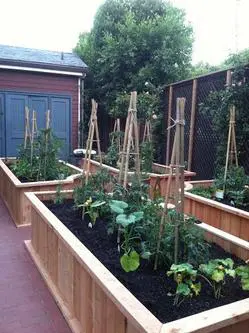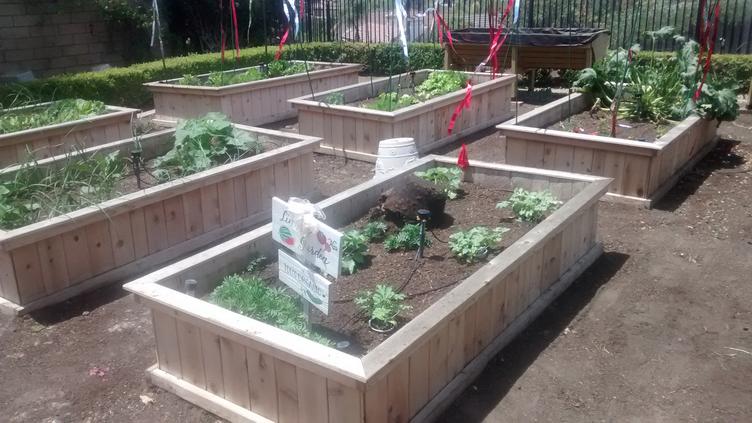Check Out Our Gardening Tips BLOG
Have fun & get inspired while browsing ideas and information to help make your patio and yard a greener place.
Custom Raised Gardens provides innovative and Earth-friendly products to enhance and aid in enjoying your home and garden.
We want to help create time with your families, a new hobby, and a healthy lifestyle...
Live for today while protecting tomorrow with green living. We garden as well and have knowledge and skills for producing the healthiest and most abundant crops.

Starting Your Own Garden
Where to start?
First, decide which type of garden you want. Check our Landscaping Accessories page for Ideas on decor and layout.
Do you want flowers or fruits and veggies?
Do you want the garden for a cleaner self sustaining lifestyle?
Decorative and architectural?
Next, pick the area you want to use for your garden. When figuring out what to plant in a garden... you don't need a large space to begin.
With our Raised Beds and Planters, you don't even need a yard -- a deck or balcony can provide plenty of space. (if you want an herb garden, you may want it closer to your kitchen for convenience, our Elevated Planters are great for little herb plants)
Do you have health requirements or need the garden at a specific height for health reasons...Check our Raised Gardens page.
Look at your outdoor environment...some gardeners like to have a cohesive design scheme in mind.
Types of Gardens
Herb Garden: Why not have fragrance and spices fresh and handy? Makes a big difference in cooking and herbal remedies.
Antioxidant Garden: Full of a variety of berries that are sweet and very delicious.
Longevity Garden: There have been proven results for mind, body, and health with certain fruits/ veggies/ herbs.
Juice Garden: Various types of juicing mixes.
Salsa Garden: However hot the salsa, and if you like cilantro or different spices.
Baby Food Garden: Organic foods without preservatives are healthier than store-bought jars of food.
Tropical Garden: Can be with a variety of greenery and flowers or fruits and veggies.
Rose Garden: Roses are fragrant and beautiful, and different colors represent different meanings as well. Fun to smell or give as gifts.
Succulent Gardens: Are very easy to maintain and regrow and have many architechtural elements for your outdoor environment.
Butterfly Garden: Not only pretty but creates an enchanting environment.
(Herb gardens fit great in our Elevated Planters for space & convenience)
And the list goes on and on.
Survive the Drought!!
How can we help keep from polluting our daily drinking water/ streams/ groundwater?
Daily use:
1. Turn OFF the water
- When Washing Dishes
- Brushing Teeth
- Showering
- Cleaning...Help Prevent Shortages/ Contamination/ & Less Treated Water
2. Don't litter
- Paints
- Oils
- Litter...Throw the Garbage in the Trash Can, Not Down the Toilet, Sink, or Drain
3. Organic Living
- Laundry Detergent
- Household Cleaning Products
- Toiletries...Better for the Environment and Water Drainage
4. Pesticides
- Use Less Fertilizers
- Pesticides...Less Chemicals Flow Into the Air and Water
The more plants and succulents you put into your landscapes, the less fertilizers and chemicals that run into the environment.
Using Raised or Above-ground Gardens will help prevent pests/ insects/ monitor water usage to keep your yards environmentally friendly.
For questions, quotes, custom orders, or to order any of the items listed Contact:
customraisedgardens@gmail.com
Showroom can be seen by appointment
How to Use Crop Rotation
Crop rotation is very important to organic gardeners.
It's the process of growing crops of different types in the same area in your vegetable garden from one year to the next. This process involves dividing the garden into sections, and planting a different plant family in each section every year.
Of course you can create your own rotation schedule based on the veggies you like to grow –As long as you keep things moving around to ensure that every section eventually receives each plant family.
Organic and home gardeners, use this process, and consider it vitally important to the health and productivity of their gardens. (If your garden is small, you may grow only a few kinds of veggies & fruits. You can easily stick to balancing out your garden with easy soil rotation.)
Below is a common and easy way to use the four-step crop rotation system in your home garden of varying sizes. Plant families are listed below:
The Four-Step System
Simply divide your garden into four sections:
(Check our Raised Gardens page for sizes)...
Group 1:
Leafy/ Flowering Plants:
- Brussel Sprouts
- Cabbage
- Lettuce
- Spinach
- Broccoli
- Other Leafy Greens
Group 2:
Plants grown for Fruits:
- Potatoes
- Tomatoes
- Eggplant
- Corn
- Cucumber
- Squash
- Peppers
Group 3:
Rooted Plants: (The Root is the Vegetable)
- Beets
- Carrots
- Onions
- Turnips
- Radish
- Parsnips
Group 4:
Legumes: (Plants with pods/casings)
- Lentils
- Peas
- Beans
- Peanuts
- Soybeans
Why Do You Need to Implement Crop Rotation?
Balancing Nutrients:
Crop Rotation is key to balancing your soil of nutrients. Different plant families absorb different nutrients into the soil.
For example, tomatoes & lettuce, are heavy feeders that quickly deplete soil of its nitrogen & phosphorus.
While rooted vegetables & herbs are light feeders, and should be planted the following season to give nutrient balance in your garden.
Reducing Insects:
When one crop is grown in the same place season after season, a build-up of the same insects creates infestations in the garden. Crop rotation helps prevent these occurrences.
Preventing Diseases:
Rotating crops keeps disease organisms from forming and spreading throughout your garden beds. They can build up over time, resulting in eventual crop failure. Rotating crops keeps these organisms in check.
Rotating crops will keep the soil from being depleted of nutrients and amending the soil while keeping your garden disease-free and preventing insect infestation; creating an organically balanced garden!
1. Big Raised Garden divided into 4 sections...
2. Raised Gardens divided into 2 sections...
3. Different Raised Gardens, each with different veggies...
Let us help you work out the sizes for the amount of crops you want to grow.
For questions, quotes, custom orders, or to order any of the items listed Contact:
Showroom can be seen by appointment
Seeds & Plants
So you are ready to start a garden!

